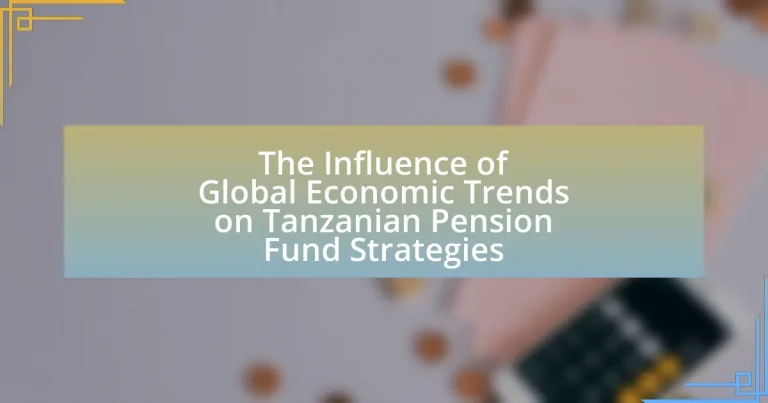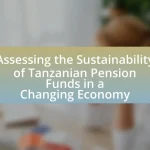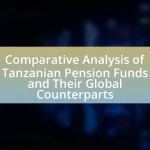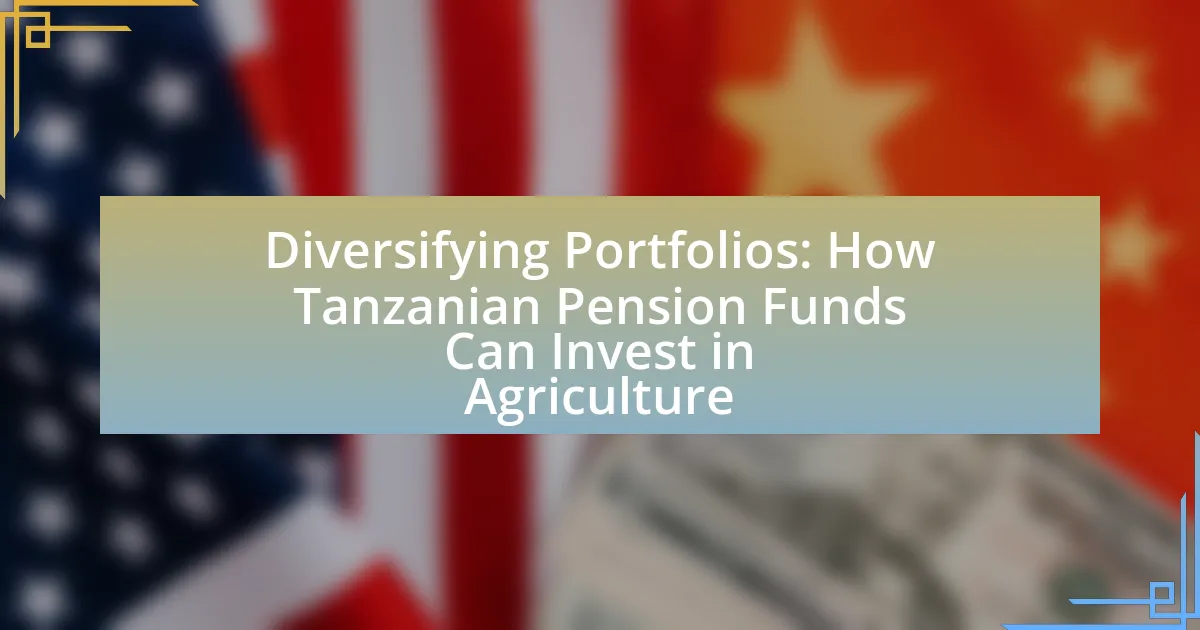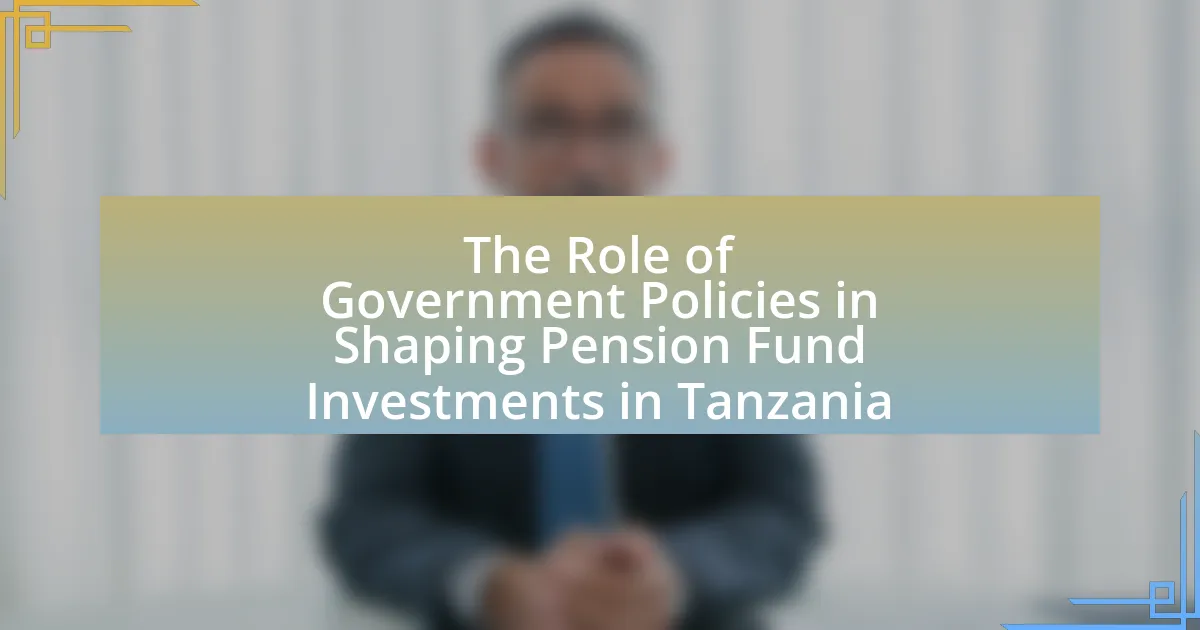The article examines the influence of global economic trends on Tanzanian pension fund strategies, highlighting key factors such as interest rates, inflation, and market volatility. It discusses how these trends compel pension funds to adjust their investment approaches, including asset allocation and risk management, to safeguard their portfolios. Additionally, the article emphasizes the importance of monitoring global economic indicators, the impact of currency exchange rates, and the role of international trade agreements in shaping investment opportunities. It also explores the implications of global supply chain disruptions and demographic changes on pension fund performance, offering insights into best practices for resilience and adaptability in an evolving economic landscape.
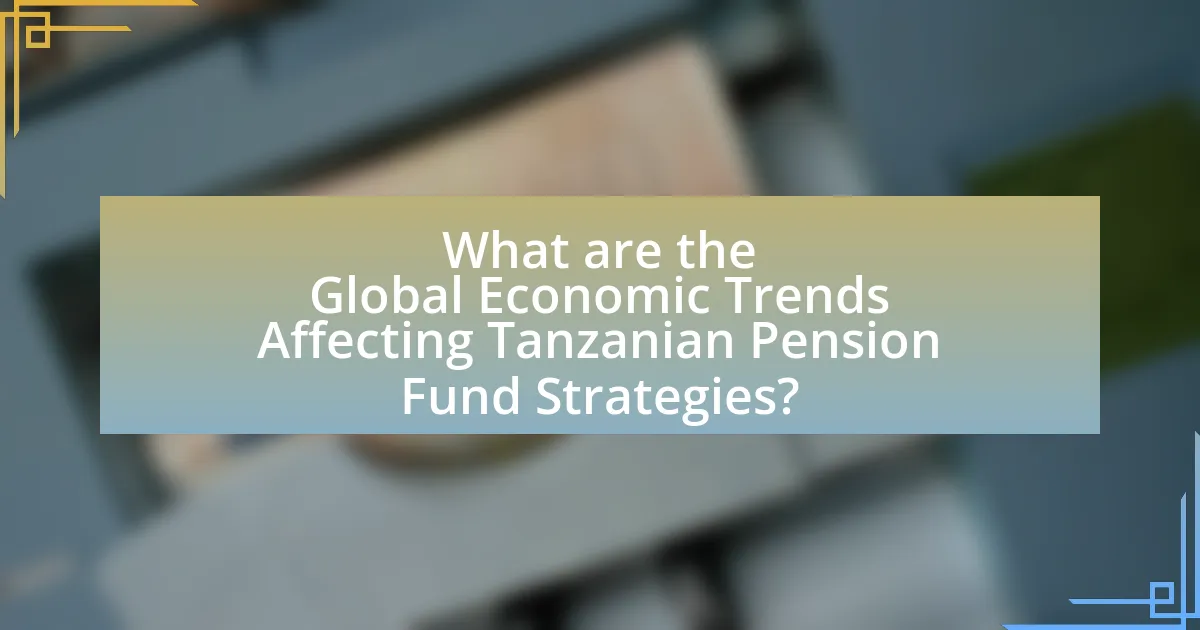
What are the Global Economic Trends Affecting Tanzanian Pension Fund Strategies?
Global economic trends significantly influence Tanzanian pension fund strategies, primarily through factors such as interest rates, inflation, and global market volatility. For instance, low global interest rates compel pension funds to seek higher returns in riskier assets, impacting their investment strategies. Additionally, rising inflation rates worldwide can erode the purchasing power of pension fund assets, prompting a shift towards inflation-hedged investments like real estate or commodities. Furthermore, increased global market volatility, driven by geopolitical tensions or economic downturns, forces Tanzanian pension funds to adopt more conservative investment approaches to safeguard their portfolios. These trends collectively shape the strategic decisions of pension funds in Tanzania, aligning them with global economic conditions.
How do global market fluctuations impact pension fund investments in Tanzania?
Global market fluctuations significantly impact pension fund investments in Tanzania by influencing asset valuations and investment returns. When global markets experience volatility, it can lead to decreased confidence among investors, resulting in lower returns on equities and bonds, which are commonly held by pension funds. For instance, during the 2008 financial crisis, many pension funds worldwide, including those in Tanzania, faced substantial losses due to declines in global stock markets, highlighting their vulnerability to international economic conditions. Additionally, currency fluctuations can affect the purchasing power of pension funds, particularly if they hold foreign assets. This interconnectedness underscores the importance of global economic trends in shaping the investment strategies of Tanzanian pension funds.
What specific global economic indicators should Tanzanian pension funds monitor?
Tanzanian pension funds should monitor global economic indicators such as interest rates, inflation rates, GDP growth rates, and currency exchange rates. Interest rates influence the returns on fixed-income investments, while inflation rates affect the purchasing power of pension payouts. GDP growth rates provide insights into economic health, impacting investment opportunities and risks. Currency exchange rates are crucial for funds with international investments, as they affect the value of foreign assets. Monitoring these indicators allows Tanzanian pension funds to make informed investment decisions and manage risks effectively.
How do currency exchange rates influence pension fund performance?
Currency exchange rates significantly influence pension fund performance by affecting the value of international investments. When the local currency depreciates against foreign currencies, the returns on overseas assets increase when converted back to the local currency, enhancing overall fund performance. Conversely, if the local currency appreciates, the value of foreign investments diminishes in local terms, potentially reducing returns. For instance, a study by the International Monetary Fund in 2021 highlighted that fluctuations in exchange rates can lead to a variance of up to 15% in the returns of pension funds heavily invested in foreign equities. This demonstrates the critical role that currency exchange rates play in determining the financial health and investment strategies of pension funds.
What role do international trade agreements play in shaping pension fund strategies?
International trade agreements significantly influence pension fund strategies by affecting investment opportunities and risk management. These agreements can open up new markets for pension funds, allowing them to diversify their portfolios and seek higher returns. For instance, trade agreements often lead to increased foreign direct investment, which can enhance the performance of domestic assets and provide pension funds with access to international markets. Additionally, trade agreements can stabilize economic conditions, reducing risks associated with currency fluctuations and political instability, which are critical factors for pension fund managers when making investment decisions. The World Bank has noted that countries engaged in trade agreements tend to experience economic growth, which can positively impact the returns on pension fund investments.
How can changes in trade policies affect investment opportunities for Tanzanian pension funds?
Changes in trade policies can significantly affect investment opportunities for Tanzanian pension funds by altering market access and investment climates. For instance, the introduction of tariffs or trade barriers can limit the profitability of sectors where pension funds have invested, such as manufacturing or agriculture, thereby reducing returns. Conversely, trade agreements that lower tariffs can enhance market access for Tanzanian exports, potentially increasing the value of investments in export-oriented industries. Historical data shows that when Tanzania entered the African Continental Free Trade Area in 2021, it opened new avenues for investment in sectors like textiles and agriculture, which are crucial for pension fund portfolios. Thus, shifts in trade policies directly influence the risk and return profiles of investments held by Tanzanian pension funds.
What are the implications of global supply chain disruptions on pension fund assets?
Global supply chain disruptions negatively impact pension fund assets by increasing market volatility and reducing investment returns. These disruptions can lead to inflationary pressures, affecting the purchasing power of pension payouts. For instance, the COVID-19 pandemic caused significant delays and shortages in goods, which resulted in stock market fluctuations; the MSCI World Index dropped by approximately 30% in March 2020. Consequently, pension funds may experience decreased asset values and increased liabilities, necessitating adjustments in investment strategies to mitigate risks associated with such global economic trends.
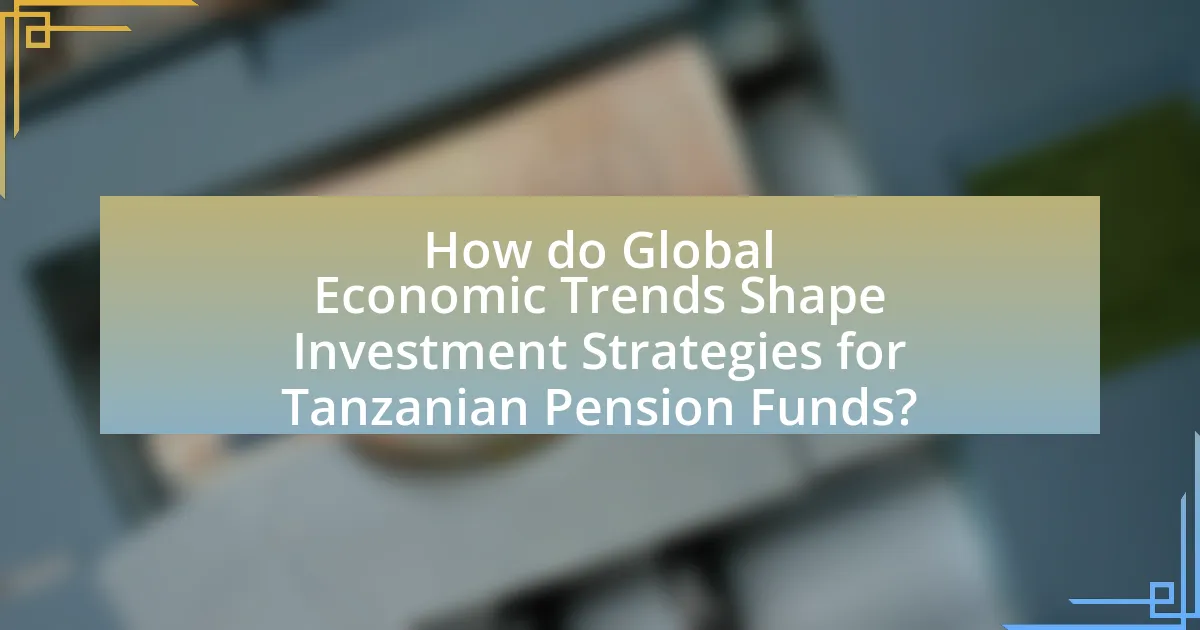
How do Global Economic Trends Shape Investment Strategies for Tanzanian Pension Funds?
Global economic trends significantly influence investment strategies for Tanzanian pension funds by dictating asset allocation, risk management, and diversification approaches. For instance, fluctuations in global interest rates can lead Tanzanian pension funds to adjust their fixed-income investments to optimize returns. Additionally, trends such as globalization and technological advancements encourage these funds to invest in emerging markets and innovative sectors, enhancing growth potential. The International Monetary Fund reported that emerging markets, including Tanzania, are increasingly attractive due to their higher growth rates compared to developed economies, prompting pension funds to seek higher yields in these regions. Furthermore, global economic conditions, such as inflation rates and currency fluctuations, compel Tanzanian pension funds to adopt hedging strategies to mitigate risks associated with international investments.
What investment strategies are most affected by global economic conditions?
Investment strategies most affected by global economic conditions include asset allocation, currency hedging, and sector rotation. These strategies respond directly to fluctuations in economic indicators such as interest rates, inflation, and geopolitical events. For instance, during economic downturns, pension funds may shift their asset allocation towards safer investments like bonds, as evidenced by the 2008 financial crisis when many funds increased their bond holdings to mitigate risk. Additionally, currency hedging becomes crucial in times of currency volatility, impacting international investments. Sector rotation strategies also adapt to changing economic conditions, as seen in the transition from growth to value stocks during periods of economic recovery.
How do interest rate changes in developed economies influence Tanzanian pension fund allocations?
Interest rate changes in developed economies significantly influence Tanzanian pension fund allocations by affecting the global investment landscape and the cost of capital. When interest rates rise in developed economies, such as the United States or the Eurozone, the returns on safer assets like government bonds increase, prompting pension funds in Tanzania to reassess their risk-return profiles. This often leads to a shift in allocations towards these higher-yielding, lower-risk assets, as they become more attractive compared to local investments.
For instance, in 2022, the U.S. Federal Reserve raised interest rates multiple times, which resulted in a noticeable increase in bond yields. Tanzanian pension funds, which aim to maximize returns for their beneficiaries, responded by reallocating a portion of their portfolios towards international bonds and equities that offered better returns in light of the changing interest rates. This behavior aligns with the broader trend observed in emerging markets, where pension funds adjust their strategies in response to global economic shifts to mitigate risks and enhance returns.
What sectors are most vulnerable to global economic shifts?
The sectors most vulnerable to global economic shifts include manufacturing, tourism, and agriculture. Manufacturing is sensitive to changes in global demand and supply chain disruptions, as evidenced by the decline in production during the COVID-19 pandemic, which saw a 6.8% contraction in global manufacturing output. Tourism is heavily impacted by global economic conditions, with the World Travel and Tourism Council reporting a 49% drop in global travel spending in 2020 due to economic uncertainties. Agriculture faces risks from fluctuating commodity prices and climate change, which can be exacerbated by global economic shifts, as seen in the volatility of food prices during economic downturns.
How can Tanzanian pension funds adapt to changing global economic landscapes?
Tanzanian pension funds can adapt to changing global economic landscapes by diversifying their investment portfolios to include a mix of domestic and international assets. This strategy allows them to mitigate risks associated with local economic fluctuations and capitalize on growth opportunities in emerging markets. For instance, according to the World Bank, diversification can enhance returns and reduce volatility, which is crucial for long-term sustainability of pension funds. Additionally, adopting advanced risk management practices and leveraging technology for data analysis can help these funds make informed investment decisions that align with global trends.
What risk management strategies should be employed in response to global trends?
To effectively manage risks in response to global trends, Tanzanian pension funds should employ diversification, hedging, and active monitoring strategies. Diversification across asset classes and geographical regions reduces exposure to specific market downturns, as evidenced by studies showing that diversified portfolios tend to have lower volatility and better risk-adjusted returns. Hedging through financial instruments like options and futures can protect against adverse market movements, which is crucial given the unpredictable nature of global economic shifts. Active monitoring of global economic indicators, such as interest rates and inflation trends, enables timely adjustments to investment strategies, ensuring alignment with changing market conditions. These strategies collectively enhance resilience against global economic fluctuations, thereby safeguarding pension fund assets.
How can diversification mitigate risks associated with global economic fluctuations?
Diversification mitigates risks associated with global economic fluctuations by spreading investments across various asset classes, sectors, and geographic regions. This strategy reduces the impact of poor performance in any single investment or market, as different assets often react differently to economic changes. For instance, during the 2008 financial crisis, diversified portfolios that included bonds and international stocks experienced less volatility compared to those concentrated in domestic equities. Historical data shows that a well-diversified portfolio can lower risk and enhance returns over time, as evidenced by studies indicating that diversification can reduce portfolio volatility by up to 30%. Thus, by employing diversification, investors can better withstand economic downturns and achieve more stable long-term growth.

What are the Future Implications of Global Economic Trends on Tanzanian Pension Funds?
The future implications of global economic trends on Tanzanian pension funds include increased volatility and the need for diversification. As global markets become more interconnected, fluctuations in international economies can directly impact local investments, leading to potential losses. For instance, the International Monetary Fund (IMF) has noted that emerging markets, including Tanzania, are susceptible to shifts in global interest rates and commodity prices, which can affect pension fund returns. Additionally, the rise of digital currencies and fintech innovations may compel Tanzanian pension funds to adapt their investment strategies to remain competitive and secure. This adaptation is crucial as the World Bank emphasizes the importance of robust pension systems in mitigating economic shocks and ensuring long-term financial stability for retirees.
How might emerging global economic trends reshape pension fund strategies in Tanzania?
Emerging global economic trends may significantly reshape pension fund strategies in Tanzania by prompting diversification into alternative investments and increasing focus on sustainable finance. As global markets evolve, Tanzanian pension funds are likely to adapt by reallocating assets towards sectors such as renewable energy and technology, which are gaining traction worldwide. For instance, the global shift towards ESG (Environmental, Social, and Governance) investing is influencing pension funds to prioritize sustainable investments, aligning with international standards and attracting foreign capital. This trend is supported by the growing recognition that sustainable investments can yield competitive returns while mitigating risks associated with climate change and social inequality.
What technological advancements could influence investment decisions?
Technological advancements such as artificial intelligence, blockchain, and big data analytics significantly influence investment decisions. Artificial intelligence enhances predictive analytics, allowing investors to make data-driven decisions based on market trends and consumer behavior. Blockchain technology increases transparency and security in transactions, which can attract more investors by reducing fraud risks. Big data analytics enables the processing of vast amounts of information, helping investors identify patterns and opportunities in real-time. These advancements are reshaping investment strategies by providing tools that improve accuracy and efficiency in decision-making processes.
How will demographic changes in global populations affect pension fund strategies?
Demographic changes in global populations will significantly impact pension fund strategies by altering the balance between active workers and retirees. As populations age, particularly in developed countries, the ratio of retirees to working-age individuals increases, leading to greater pressure on pension funds to meet payout obligations. For instance, the United Nations projects that by 2050, the number of people aged 60 and older will double, reaching 2.1 billion, which necessitates pension funds to adjust their investment strategies to ensure sustainability. This may involve shifting towards more conservative investments to protect capital, increasing allocations to healthcare and eldercare sectors, and exploring innovative funding mechanisms to address the growing liabilities associated with an aging population.
What best practices can Tanzanian pension funds adopt to remain resilient?
Tanzanian pension funds can adopt diversification of investment portfolios as a best practice to remain resilient. By spreading investments across various asset classes, such as equities, bonds, real estate, and alternative investments, pension funds can mitigate risks associated with market volatility. For instance, a study by the World Bank indicates that diversified portfolios can reduce the impact of economic downturns, enhancing overall fund stability. Additionally, implementing robust risk management frameworks allows pension funds to identify and respond to potential threats effectively, ensuring long-term sustainability.
How can continuous education and training improve decision-making in pension fund management?
Continuous education and training enhance decision-making in pension fund management by equipping professionals with updated knowledge and skills relevant to market dynamics. This ongoing learning process allows fund managers to better understand complex financial instruments, regulatory changes, and emerging economic trends, which are crucial for making informed investment decisions. For instance, a study by the CFA Institute found that investment professionals who engage in continuous education demonstrate improved analytical skills and risk assessment capabilities, leading to more effective portfolio management. By staying informed about global economic trends, such as shifts in interest rates or inflation rates, pension fund managers can adapt their strategies to optimize returns and mitigate risks, ultimately benefiting the fund’s beneficiaries.
What collaborative approaches can enhance the effectiveness of pension fund strategies?
Collaborative approaches that can enhance the effectiveness of pension fund strategies include partnerships with financial institutions, engagement with stakeholders, and participation in industry coalitions. These collaborations enable pension funds to leverage expertise, share resources, and access a broader range of investment opportunities. For instance, partnerships with banks and investment firms can provide pension funds with advanced financial products and risk management tools, which are crucial in navigating global economic trends. Additionally, engaging with stakeholders, such as beneficiaries and regulatory bodies, ensures that pension funds align their strategies with the needs and expectations of their members, fostering trust and transparency. Participation in industry coalitions allows pension funds to advocate for favorable regulatory environments and share best practices, ultimately leading to improved investment performance and sustainability.
